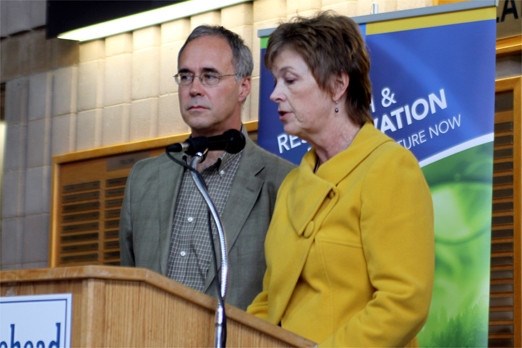With an aging population and a high incidence of chronic disease, the need for palliative care in First Nations communities is becoming increasingly crucial.
“End-of-life care in First Nations communities is a huge issue,” said Holly Prince. “Offering them choices and options in their communities to die at home is very important.”
Prince is the project manager for a research project aiming at improving palliative care services in First Nations communities that received a five-year $1.825 million Canadian Institutes of Health Research Aboriginal Health Intervention Grant.
The project is a collaboration between Lakehead University’s Centre for Education and Research on Aging and Health, Aboriginal health organizations and four First Nation communities, which includes Fort William First Nation.
The research team will be working with the four communities to identify their needs and solutions in order to develop palliative care that works for them. Their findings will eventually be distributed nationally to numerous types of Aboriginal health organizations.
Previous research conducted in Northwestern Ontario showed Prince that 75 per cent of people said if services were available and adequate in their communities, people would choose to die at home.
“The reality is First nations people are still having to leave their communities, to die in hospitals away from away from their communities and they have no friends and family members with them,” she said. “This type of grant and this type of work … is really important because it’s giving them choices at the end of their life; choices to live out their lives in the best place they can, surrounded by family and friends and be able to connect with their culture and their language and traditions within their home communities.”
Principal investigator for the project Mary Lou Kelley said this grant is by far the biggest and most prestigious grant CERAH has received.
Since 2003, they’ve received financial support on a smaller level from organizations like Ministry of Health and Long-Term Care that have allowed them to prove themselves and demonstrate their research is successful, said Kelley.
“We have quite a few preliminary findings and a pretty well developed methodology on how we would go forward and that has made us successful in getting us this national peer-reviewed research grant,” she said.
Kelley added the work is also a celebration of their First Nations partnerships.
“They are going to be doing the work,” she said. “Without them this would not have happened nor would it be successful into the future. I really have such a lot of appreciation and respect for them.”
Along with Fort William First Nations, Naotkamegwanning First Nation, Six Nations of the Grand River Territory and Peguis First Nation of Kenora, Hamilton and Winnipeg respectively will be participating in the project.
“End-of-life care in First Nations communities is a huge issue,” said Holly Prince. “Offering them choices and options in their communities to die at home is very important.”
Prince is the project manager for a research project aiming at improving palliative care services in First Nations communities that received a five-year $1.825 million Canadian Institutes of Health Research Aboriginal Health Intervention Grant.
The project is a collaboration between Lakehead University’s Centre for Education and Research on Aging and Health, Aboriginal health organizations and four First Nation communities, which includes Fort William First Nation.
The research team will be working with the four communities to identify their needs and solutions in order to develop palliative care that works for them. Their findings will eventually be distributed nationally to numerous types of Aboriginal health organizations.
Previous research conducted in Northwestern Ontario showed Prince that 75 per cent of people said if services were available and adequate in their communities, people would choose to die at home.
“The reality is First nations people are still having to leave their communities, to die in hospitals away from away from their communities and they have no friends and family members with them,” she said. “This type of grant and this type of work … is really important because it’s giving them choices at the end of their life; choices to live out their lives in the best place they can, surrounded by family and friends and be able to connect with their culture and their language and traditions within their home communities.”
Principal investigator for the project Mary Lou Kelley said this grant is by far the biggest and most prestigious grant CERAH has received.
Since 2003, they’ve received financial support on a smaller level from organizations like Ministry of Health and Long-Term Care that have allowed them to prove themselves and demonstrate their research is successful, said Kelley.
“We have quite a few preliminary findings and a pretty well developed methodology on how we would go forward and that has made us successful in getting us this national peer-reviewed research grant,” she said.
Kelley added the work is also a celebration of their First Nations partnerships.
“They are going to be doing the work,” she said. “Without them this would not have happened nor would it be successful into the future. I really have such a lot of appreciation and respect for them.”
Along with Fort William First Nations, Naotkamegwanning First Nation, Six Nations of the Grand River Territory and Peguis First Nation of Kenora, Hamilton and Winnipeg respectively will be participating in the project.
